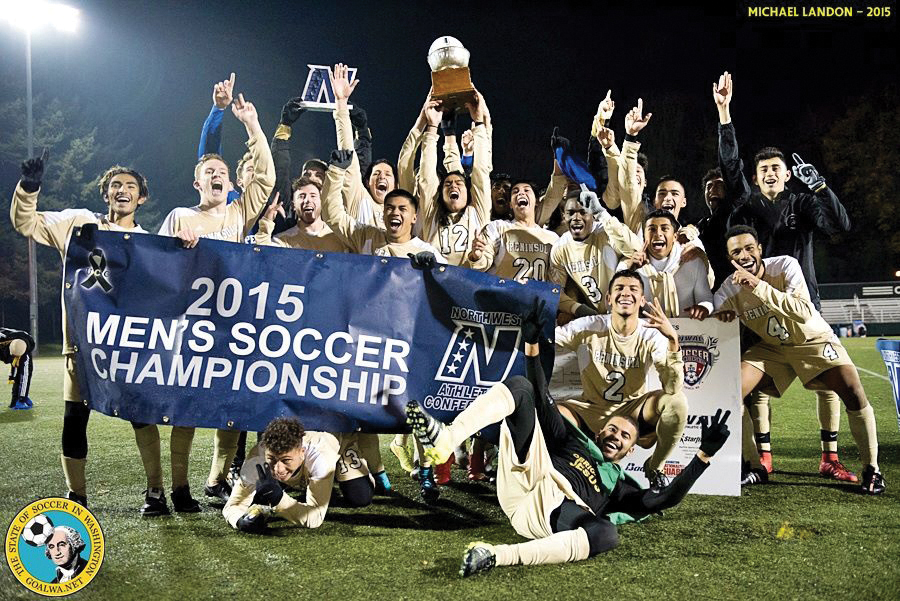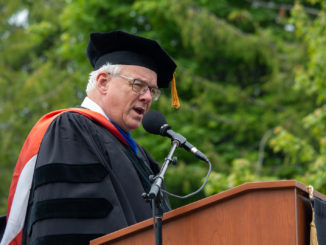
PC gets 6 new teachers

By SANDRA DAVIS
Opening of the 1978 fall quarter brought several new faces to the PC campus, with six appointments
made to the faculty to replace vacant positions on
the staff due to resignations, personal leave, and a sabbatical. The new teachers are Dr. Dennis C. Shaw, Williston Wirt, Jeffrey C. Ruble, Todd Jefferson, Rita Barschot, and Kenneth Jacobson. Dr. Shaw replaces Dr.
Marilyn Morgan, instructor in sociology and anthropology, who resigned last spring. He received his Ph.D from Washington State University, and his master’s and bachelors degrees from Florida State
University. He has worked in different geographical areas such as Coeur D’Alene, Ida., and Tallahassee, Fla., as an anthropologist for the Bureau of Land Management, and archeological assistant at
the National Park Service’s Southeastern Archeological Center in Tallahassee.
Dr. Shaw’s goals at PC are to build enrollment and enthusiam in the social sciences. He says social
sciences not only are useful academically, but also are a sort of personal orientation helpful in learning about oneself. “I would like to revive the introspective enthusiam of the 1960’s,” he said. Dr. Shaw also hopes to teach courses on Non-westem religions and cultural linguistics, through his studies of the Eskimo and the aborigine language of Taiwan. Mr. Wirt is teaching biological sciences at PC for one quarter to replace Ed Tisch while he finishes research on a book of the Olympic Peninsula. Mr. Wirt received his bachelor degree from the University of California, Berkeley, and his master’s from San Francisco State College. He was a research fellow in fish behavior at the University of Oregon and research assistant at the Oregon Institute of Marine Biology. In order to fulfill his curiousity and research interests, Mr. Wirt has taken a two year trip around the world to Australia, Europe, the Middle East, North Africa, Russia, the South Pacific, and Asia. During
his teaching at Peninsula College, Mr. Wirt says he would like to arouse as much interest in the biological science field as he can. Replacing Pam McRae in the math lab is Jeff Ruble. He recieved his bachelor’s degree from the University of California and his master’s from San Jose State University. Mr Ruble said this isn’t his first experience with a teaching technique such as the math lab. “A similar method ot teaching was used when I taught at the Palo Verde College in Blythe, Calif., he said. “My major goal while at Peninsula College is to stimulate enough interest in students so they will take all the math courses, ranging from Math 101 to calculus and accounting,” he says. Mr. Ruble has also taught computer sciences, physics and statistics
courses in his teaching career, and hopes to be able to employ this knowledge in courses at PC.
Succeeding Margaret Holm Spillane in the English department is Todd Jefferson, who received a
master’s degree in English from Western Washington University after completing undergraduate studies at St. Andrew’s College, at Laurinburg, N.C. He is directing the writing lab, a study skills
course, English 10, and a night course of English 101. Mr. Jefferson dealt with students through writing labs when he taught at Lincoln High School in Seattle, and urges any students having problems with grammar or writing compositions to come see him. His major interests lie in song and poetry writing, where he’s had several of his compositions published in literary magazines and a
composition textbook. Rita Barschot will be teaching chemistry for one year, replacing Philip Churchley, who is on sabbatical leave. She completed her master’s degree at the University of Washington, her bachelor’s degree at Lone Mountain College, San Francisco, and has taken additional higher education studies at the University of San Francisco. She prefers the community college level of teaching to the four year institution because of its more personal tendencies. Ms. Barschot says she tries to construct* her courses around student’s goals and teach in as clear a fashion as she can. “So far,” she said, “I’ve been very impressed with the enthusiam of the students.” Primarily, she wants students to know her door is open at any time, and hopes they will seek assistance when needed. Ken Jacobson is the new addition to the electronics program at PC. He will be teaching alongside Clinton Skinner as a full time instructor. Although he attended Peninsula in 1968, this is Mr. Jacobson’s first teaching job at the college. His electronics experience includes working as service manager and conducting weekly employee training sessions at Pacific Television Service, and electronics repair for Sears and McCrorie’s, all in Port Angeles. He has also served on the vocational advisory committee for electronics at Peninsula College. The number of students in the electronics program has been growing rapidly and the appointment of Mr. Jacobson is the first step the college has taken to improve the quality of instruction in this area. “Before, the program was aimed in all directions, and students weren’t gettingjobs. Now, we’re training technicians instead of engineers to meet the needs of this community and large corporation,” he says. Mr. Jacobson stressed that openings are still available in the electronics program and that late entries are still being accepted. Tutorial assistance and government produced films on material already covered will be offered to new students.
Labs help students read,write,do math.
Students needing help
to improve reading composition, vocabulary, and
study skills, may sign up at
R-50 development center
(reading lab) for English
13-C course, which begins
Wednesday. The class will
be held every Monday,
Wednesday and Friday at
12, with an additional one
hour lab each week.
The program is designed to help students at their
level, on an individual
basis, according to director
Larry Welch.
Other courses offered
at the reading center are
spelling, study skills, general education diploma,
adult basic education, English 10, and English as a
second language.
Todd Jefferson, director of the writing lab held in
H-7, encourages students
with questions pertaining
to writing techniques, or
needing help with writing
skills, to drop by the lab
between 1 and 3 Mondays
and Wednesdays, 12 to 3
Tuesdays and Thursdays,
and 9 to 11 Friday mornings.
The program will offer
some class instructions, but
mainly small group and
individual help.
Special sessions on
particular writing and
grammar skills will be held
periodically and will be
announced prior to the
given day.
Students in the math
lab class are required to put
in a certain amount of hours
at H-4, where the math lab
is open from 9 to 3 weekdays and 7 to 9:30 p.m.
every Mondays, Wednesdays and Fridays.
Other students needing a place to work or
having questions or problems related to math may
also use the lab, where
instructors are always there
to assist.
Math lab director is
Jeff Ruble
Geology students to go flying
PC instructor Ron
Crawford has made some
changes in the physical
sciences department.
The earth sciences
class has been revised from
a four credit class to five
credits. In addition, Mr.
Crawford plans to take the
students flying over the
Olympics for an aerial view
of the geological features of
this area.
The class meets daily
from 2 to 3 p.m. with a lab
on Tuesday from 2 to 4 p.m.
Interested students who
have not registered should
see Mr. Crawford.
Enrollment equal to ’77
Registration for the fall
quarter seems to be about
the same as the previous
year, according to Registrar
Frances Prindle.
Although fewer students signed up the first two
days, the total count as of
October 22 was 1,528.
Approximately 900 are day
students, while 600 are
registered for night school.
According to Ms. Prindle
the trend is holding with last year-51 percent in vocational studies and 49 percent academic. Students with any questions, complaints, or registrations process are welcome to talk to Ms. Prindle.
Editorial
Take advantage of advisors
Last year, a frequent comment heard around campus
was, “Gee. I don’t know what my major is going to be or
what courses I should take.” That was understandable m
fall quarter—but not in the spring.
Peninsula has an able and willing counseling staff, as
well as an adviser assigned to each student. The adviser is
selected to complement as nearly as possible the student s
needs and interests. His job is to review the student’s
outlined classes and help the student understand what is
required for the type of degree he wants. It is not the
adviser’s job to make decisions for students or to lay out
their whole schedules. They are only a guide and a
reference point to help the student in the right direction.
The counselors, on the other hand, are there to help
the student not only find his interests, but also to explore
areas of strength and weakness, to examine career goals
and possibilities, and determine what skills the student
has. They utilize counseling, testing and a computer file of
jobs, their requirements and prospects. The counseling
department is designed to aid students who are not sure
where they are going or what they want, as well as the
students who have a good idea.
College is a big step for students, and an expensive
one. It would be wise, then, for the student to get as much
out of the experience as he can. We can all improve the
quality of the education we get by taking the time to seek
out our advisers and counselors and take a few minutes to
find out if we’re headed in the right direction, and, as we
progress, to make sure we stay on the track.
Many advisers seldom or never see their students
except for the quarterly registration appointments. And
that’s a shame. The advisers have a wealth of knowledge
and information they can share with us if we take the time
to let them know what it is we are looking for and what we
want to do with our lives. They are not mind readers. They
can only respond to what we tell them. They can be
invaluable in guiding us toward courses that would help
background us, books that relate to our specific fields,
special programs and interests that we might not find on
our own.
For all our sophistication and independence, we often
tend to rigidly “do it ourselves,” and sometimes we pay
the price because we were too short-sighted. We have the
right to use the counselors and share the wealth of their
experience and knowledge. What we might find along the
way is a friend we can work with and enjoy, as well as
benefit from.
Any student who is not happy with his adviser can
request a different one. Request forms are available in the
office.
Part of the wisdom of adulthood is knowing when to
seek advice and help. We get out of life only as much as
we are willing to put into it. Take the time. Make your
education the best, the most complete it can be. Taik to
your adviser. He’s willing to talk to you.
—Cathy Logg
The Counselor’s Corner
Counseling helps students
Many students may
not be aware of the existence of the counseling
center in the Student Service Building, but Dick
Hendry, director of counseling, plans to change all
that. He admits that in the
past PC’s counselors have
waited for students to approach them. But this year
he hopes to reach out to the
student population.
The Counseling Center
offers a number of services
to students to help them
determine their capabilites
and interests in searching
for a career. Kathy Murphy, counselor in vocational
and health related areas;
Phil Adams, director of
minority affairs; and Bob
Willicut, director of veteran
affairs, also have offices in
the Student Service Building and are available to
assist students in exploring
their areas of interest.
Mr. Hendry says many
people don’t appreciate
what can come out of a half
hour discussion with a
counselor.
“We are here to help
people evaluate their lives
up to this point, and make
objective and subjective
decisions about their future,’’ Mr. Hendry says.
With this guidance students may determine their
capabilities and interests in
terms of a career and
lifestyle. He says it is
important to look at the
career and respective lifestyle as indigenous factors.
“One certainly has a
direct effort on the other,”
he said.
The Washington Occupational Information Service is one of the many resources available for students use. It is a state-wide computer system that gives access to specific training and career information such as hiring practices, complete job descriptions, work settings, wages and job outlook.
Interested students simply fill out a questionare concerning their career or life style preferences, then make an appointment through the Counseling Center with Carolyn Spiess, who types their responses into the computer. Students are able to control what intormation they recieve according to their needs and responses.
Tutorial assistance is also available for “vocational” students, student vetrans and native american students. Transfer information can also be obtained for students planning to go to four year institutions.
A new addition to the career-guidance program is the visit file, approximately 60 files which consists of
information and pamphlets
from local business.
Through permission by
the co-operating businesses; students are invited to
visit local offices for interviews to learn more about
their fields of interest. This
service is accessible to all
students.
Anyone interested in
developing ideas concerning their future careers or
life style should consider
counseling. Counselors
assist students in understanding the relevancy and
significance of the information they find, but the
students are given the
actual responsibility to conduct their own self assessment. and career search.
Mr. Hendry stressed
that although Peninsula’s
Counseling Center deals
primarily with career opportunities and life style
awareness, they do open their doors to personal guidance services also. “It’s most important, that people know we’re here and willing to help in any way we can,” Mr. Hendry concludes.
Poetry reading set for Thursday noon
The Foothills Poetry
series will begin its fourth
year of reading next Thursday, featuring writers from
the Pacific Northwest and
Canada.
These readings will be
held monthly throughout
the year, at noon in the
Little Theater. All readings
are free and open to the
public, and writers will be
available for personal contact following the readings.
The series is coordinated by Jack Estes, English
instructor on campus, and sponsored by the college public service committee.
The first reading will
feature Raymond Carver, a
poet and short story writer
now teaching at the University of Texas in El Paso,
and part of the staff of the
Goddard writing program.
Carver taught at the
University of California at
Berkeley, at Santa Cruz,
and at the Writers Workshop in Iowa.
He has published two
collections of short stories:
“Will You Please Be Quiet,
Please” (1977), and ‘‘Furious Seasons (1978). He has
also published three collections of poetry: “Near
Klamath,” “Winter Insomnia,” and “At Night the
M Salmon Move.”
ASC Petitions due
The Associated Student Council (ASC) has six petitions open to persons interested in becoming part of Peninsula’s student goverment, although petitions must be turned in by today.
Positions open are three representatives for the freshman class and three for sophomore. Three positions also are open for pep boosters.
Those who choose to run for positions must see Jim Lunt, director of student services, or ASC President Jim Cameron, and acquire a petition from them. Then the person must get at least 35 students signatures from the candidates class during the week of Oct. 2-6. Completed petitions must be returned to Mr. Lunt or Jim Cameron. The following week will be the election.
WSU Rep. to visit campus
A representative from
Washington State University will be on campus
Monday, Oct. 16, from W
a.m. to 1 p.m.
Students interested in
transferring to WSU should
see the representative in
the PUB gallery. Students
also should request a copy
of their transcripts from the
registrar’s office prior to
the visitation, for the representative’s use.
Saga offers snack bar,lunch line
Saga food service will
be seeing some positive
changes during the 1978-79
year, according to director
Chuck Urbanowicz.
He asks students to
put their ideas in the
boarders’ dining hall suggestion box, which has
already received new food
item ideas for Mr. Urbanowicz and his staff.
Boarding students
nave a salad bar, food line
and dining area separated
from the snack bar, which
is open from 7:30 a.m to 3
p.m.
Choices of five salads, three entrees, and four desserts are available to boarders at every lunch at every lunch and dinner session. For other students wanting this service, a monthly lunch meal ticket allowing the same benefits as the boarders will be available soon.
Canadian hot dogs soon will be available as a new food item, Mr. Urbanowicz said.
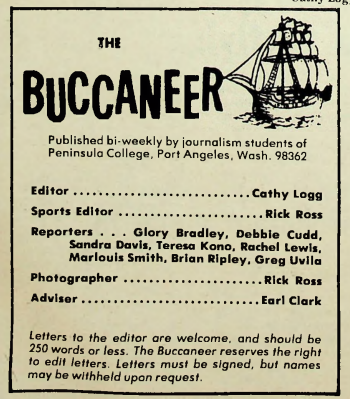
V’ball season opens
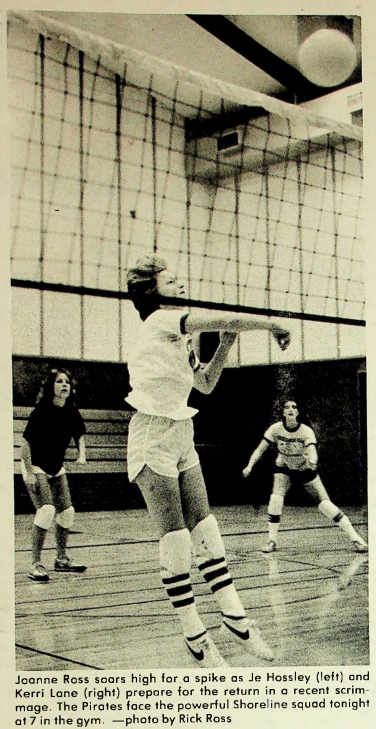
The Peninsula Pirates
girls volleyball squad opened its third season Wednesday night against the league’s newest addition,
Seattle Central Community
College in Seattle.
They’ve got a lot of
spirit this year,” said
Coach Nancy Meinke, “and
they’re not afraid to attack
the ball.” Her Pirates’
spirit and aggressive offense will be tested tonight
as they face the ’77 league
champs, Shoreline, on Peninsula’s home court.
Experience may be the
key to the squad’s success
this year, as all six Pirate
starters have high school
team vollyball backgrounds.
It will take some time
for the new team to adjust
to each other’s play, says
Ms. Meinke. They are
presently working hard on their defensive skills in preparation for tonight’s game.
The Pirates will be
running a 4-2 offense this
year and a red (man-up)
defense designed to cover
the dink.
Peninsula’s starting six are all freshmen this year. Pirate hitters are Sheila Murphy from spokane, Joanne Ross from Morton, Kathi Good from Sequim and Kerri Lane out of Port Angeles. Pirate setters are Jenny Webber, and Karen Hopkins both of Port Angeles.
The remainder of the
team consists of Gay Dotson, PC’s only returning
veteran, Je Hoessley, Denise Dailey, Pam Beard,
Julie Leavitt and Cheryl
Shaw. Jamie Anderson is
the squad’s manager and
Roberta Butts is this year’s
scorekeeper.
“Community college
teams change so much each
year it’s really hard to know
what to expect,” says Ms.
Meinke. She added that the
overall team experience
and a hopeful boost in
spectator support will be all
that is necessary to provide
an improved squad from
their previous season.

Frisbee event added to fall intramurals
Keeping up with the
times, the intramural
schedule for fall has added
frisbee throwing as one of
its sports.
This new event was
explained in more detail
during a meeting held
Tuesday noon in the gym.
Frisbee events will include distance throw, team
contest and partners, for
distance and accuracy. Also
tentatively scheduled are
frisbee golf and free style.
Flag football will consist of two halves, each half
consisting of 20 plays, 10
plays for each team. The
games will end at 12:40
p.m. Fall horseshoes matches consist of two out of
three games, the first person or team reaching 25
points being the winner of a
game.
Fall tennis will be for
singles (men and women),
doubles (men and women),
and mixed doubles.
People interested in
these events should have
registered prior to Wednesday.
Schedules and tournaments will be posted on the
bulletin boards.
More information on
intramural sports is available from Nancy Meinke,
intramural director, in the
Student Services offices.
PC intramurals
‘Get involved now!’
By RICK ROSS
Only 12 days have passed since we were all enjoying
our summer break, and yet the second volleyball game,
the first dance and the beginning of fall intramurals is
already upon us.
How are dancing, volleyball and intramurals related?
Well, they’re all PC acitivites in which anyone can
take part. However, with only five dances scheduled and
varsity sports somewhat limited to spectator participation,
that leaves Peninsula’s intramural program for the
approximately 900 day students to get involved in.
Unfortunately, 900 students is somewhat above the figure
which might be expected to participate in this year’s IM
program.
Intramural director Nancy Meinke has worked out
most or all of the problems that may have been present in
her first year as director and is looking for a smoother
system this year. The IM handbook will be of major help in
familiarizing the students with her program.
Why don’t more people get involved in intramural
sports? Peninsula’s IM program is a good one. The main
objectives include having fun, meeting lots of people,
sharpening athletic abilities, improving self physical
fitness and getting away from the every day hum-drum
college rut that often sets in between vacations.
All it takes to get into Peninsula’s IM program is
filling out a sign-up sheet located in both the gym or fine
arts building. Students must be aware that you do not
have to get a team together to get into team sports. You
can simply sign up and you will be placed on a team. Take
the time to at least check it out and see what Peninsula’s
intramural program can do for you.
PC offers skate class
A new class on roller
skating is a first for Peninsula College.
With the introduction
of a roller skating rink in
Port Angeles, classes are
being offered on how to
skate, from the basics to
dancing on skates. This
class is a one credit, two
hour course. Skating with
instruction will be Tuesday
and Wednesday, 1:30 to
2:30.
The rink is Family
Skate Center at 707 Chase
St. (Just behind Pay ’n
Save). The instructor is
Penny Brewer, 457-1434.
Team needs manager
The Peninsula Pirates
basketball squad needs a
manager for the upcoming
season. The student must
be reliable and be available
every day after 2 p.m.
The position involves
helping out at practices and
games, such as taping
players’ ankles.
Anyone interested in
being Peninsula’s manger
this year should see PC
coach Mike Clayton.
New club organized
Circle K International,
the largest collegiate organization in North America, has had a rebirth at Peninsula College.
active here since 1963, met
Sept. 28 in the board room.
Circle K is a service
organization sponsored by
Kiwanis International,
through which Peninsula
College students can find a
means of responsibility in
the community and on
campus.
“Circle K is pretty
much what the students
want it to be. We’re mainly
looking for freshmen, but
also sophomores as well ”
leader Ted Graves stated.
Pirate Pete’s Pal
Kathi Good likes challenge, action
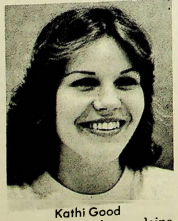
“I think our team will
do really well this season.
We have a young team with
a lot of experience,” says
Kathi Good, volleyball
player for PC.
Kathi, a freshman, has
been playing volleyball for
four years. She lettered in
volleyball while playing for
Sequim High School.
This is Kathi’s first
college team experience,
and in her words, “playing
for Peninsula is really
great!”
Kathi, a music major,
plans on going on to the
University of Washington
and playing there. She says
she plays sports both for
the thrill of competition and
for fun.
Kathi was Sequim’s
Irrigation Festival queen
this year. “I really like to
get active,” she explains.
She likes to twirl the baton,
sew, and sing. She lives on
a farm, and gets to drive a
tractor and help with the
farm.‘ ‘A challenge gives
you fulfillment. Without a
challenge there is no reason
to do it,” says Kathi.
Mausolf working for Elwha fish runs
By TERESA KONO
Restoring fish runs
above the Elwha dams is a
project that has interested
Robert Mausolf, fisheries
instructor, for several
years.
After an absence of the
fish runs for more than 65
years, various state and
federal agencies are again
becoming concerned about
the environmental and economic disadvantages
caused by the elimination
of the fish runs as a natural
resource. With most of the
Elwha located within the
Olympic National Park, the
park is interested in seeing
the river returned to its
natural state.
Recently, Mr. Mausolf
noticed commitments from
the National Park Service
and the Department of
Interior that the runs be
restored, and a recommendation by the Department
of the Interior that the
upper dam not be relicensed until there is some
kind of “unified solution to
the problem of fish passage
on the Elwha.’’
The facilities necessary to move the fish around
the dams include a ski-lifttype apparatus that would
take adult fish over the
dams, and a release system
that would either modify
existing surge towers or
penstock openings so
young fish migrating downstream could be intercepted
and avoid the turbines.
‘ ‘It might take at least
two years to design and
build the necessary facilities and five years for an
appreciable run to be reestablished if we could get
started right away,’’ Mr.
Mausolf stated.
A primary consideration in restoring the run is
the cooperation of all governmental and private
agencies with authority,
jurisdiction, or interest in
the Elwha River. With so
many parties affected, each
with their own objectives to
protect, there are many
questions to be settled such
as the species and numbers
of fish, when, how and by
whom they can be harvested, and how to design
facilities which are compatible both with Crown Zellerbach, which owns the
dams, and the government
agencies.
“There is a great deal
of interest now, with the
commitment from these
two important agencies, the
National Park Service and
the Department of the
Interior. The momentum is
certainly picking up,” Mr.
Mausolf stated.
Because of his nonofficial status, he sees his
primary task as motivating
and helping the various
agencies and individuals
concerned with the Elwha
to work together to restore
the runs above the dams.
He also sees the Elwha
as an important learning
experience for the college
fisheries technology student. “It’s the finest living
laboratory we could get—
and just seven miles
away,’’ he says.
Mr. Mausolf said the
national park has already
expressed interest in using
students for data collection
on the river above the
dams, and being involved
in identifying, marking,
counting fish, and evaluating the harvest. Working
with various agencies concerned with the Elwha
would also provide a good
learning experience.
In addition, he and all
the fisheries students this
year will be involved in a
“research project to determine the Elwha River flow,
silt, gravel deposition, productivity, fish life, and
social and economic implications of a change, for use
by governmental agencies
and environmental impact
statements.”
“Every aspect of what
a fisheries technician does
would be involved in the
project,’’ Mr. Mausolf explained. “For me, it would
be a dream come true
because the students could
gain practical experience
while working on a project
of real value.”
Former student teaches Mechanics for women
Mrs. Denise Fletcher,
former PC student, is back,
teaching auto mechanics
for women.
Auto mechanics for
women?
Mrs. Fletcher says: “I
feel that because more
women are working, they
are therefore becoming
more mobile and naturally
becoming more dependent
on their cars. Therefore it is
only sensible to become
familar with the function of
one’s automobile, so if any
trouble does arise, one can
deal with it.’’
“With a woman teaching the class it makes it
easier for other women to
identify with the subject,’’
she says, “whereas if a
man was teaching, some
women would be afraid to
ask questions for fear of
being considered ‘Another
dumb woman.’ Men do
have the tendency to talk
down to women —not that
they necessarily mean to.’’
Mrs. Fletcher says a
woman with a two-year
auto mechanics degree has
a good chance of being
hired in Seattle. She explains that when she was
looking for employment in
Port Angeles, the only
firms that took her serious
ly were the Standard service stations.
When Mrs. Fletcher
isn’t teaching or working on
cars, she is a professional
astrologer.
Mrs. Fletcher’s auto
mechanics for women is
taught Monday nights from
7 to 9
Cornaby to teach English lit classes
Dr. Paul Cornaby,
President of Peninsula College is returning to the
classroom in instruct English Literature 260, to help
fill the gap left while
English instructor Margaret Holm Spillane is on an
unpaid leave of absence.
He stated he is offering basically the same
course as Mrs. Spillane so
that the class follows the
course description in the
college catalogue.
The period covered by
English 260 is from 449
A.D., which marked the
end of Roman occupation of
England, through about 1674. The last work of this
period to be covered is
Milton’s “Paradise Lost’’,
with the bulk of the literature written in the Elizabethan period.
Dr.-Cornaby’s favorite
author from English literature is Chaucer, because
“Chaucer leads one on
because of his incontrovertible genius.” His favorite
Chaucer work is “Treatise
on the Astrolabe”.
This course holds particular interest to Dr. Cornaby because this past sum-
mer he and his wife, Betty,
spent a month touring
England. While there, they
visited many locations of
importance to English literature such as the fabled
castle of King Arthur,
Kenilworth Castle, made
famous by Sir Walter Scott,
and viewing manuscripts
from Beowulf and Chaucer.
They also saw the tomb of
Chaucer at Westminster
Abbey.
His most important
objective in instructing this
course is “to make the
students feel the significance of the literature
covered as part of the
background of our history
and culture.”
The last time Dr. Cornaby taught English was in
the 1966-67 school year at
Seattle Central Community
College. He left teaching at
that time to become associate dean of instruction in
the spring of 1967. He
came to Peninsula College
as president in July 1975.
Dr. Cornaby plans to
instruct English Literature
261 and 262 winter and
spring quarters, covering
literature from 1674
throught the present.
Tidepools to meet
Planning is under way
for the Peninsula College
literary magazine, Tidepools.
Students interested in
working on the staff are
asked to attend a meeting
Tuesday noon in FA 25.
Tidepools publishes
stories, poems, essays, artwork and photography from
students and will be sold in
the spring. Past issues of
Tidepools are on sale in the
bookstore.

Film series opens Oct.9
“ Movies that make a
difference” is the title of
Peninsula College’s fall
film series. The series will
begin Monday and will
include full length feature
films from the 20s, 30s,
40s, 50s and 70s. A short
feature will be shown with
every film. ‘These movies are not
only considered standouts
but were the building
blocks of the industry,”
says series coordinator Jack
Estes. The films include
three silent films circa
1925-26, two French films,
and the world’s first “talkie” with Al Jolson.
Individuals may register for the films until the
first showing. Those wanting three transfer credits
must sign for English 126,
Art of the Film, and also
attend classes Tuesday and
Thursday from 2 to 2:50.
The cost of the series is
$8.50 for full-time students
and $10 for others. A brief
introduction and printed
background sheet will be
included with each showing, Mondays at 7 p.m., in
the college Little Theater.’
“Greed,” the first
film, was produced in 1925
and cost a half million
dollars. Erich von Stroheim
shot 130 reels of film for it
in 1923. It is said to be one
of the most uncompromising pictures ever made and
is a presentation of naturalist Frank Norris’ novel,
“McTeague.”
Also included is
“Film: The Art of the
Impossible,” a documentary by Michael Ritchie.
Other movies for the
series are:
Oct. 16, “The Black
Pirate;” Oct. 23, “The
General;” Oct. 30, “Boudu
Saved From Drowning;”
Nov. 6, “Little Cesar;”
Nov. 27, “Breathless;”
Dec. 4, “Brewster McCloud;” Dec. 11, “The
Effect of Gamma Rays on
man – in – the – Moon Marigolds.”

